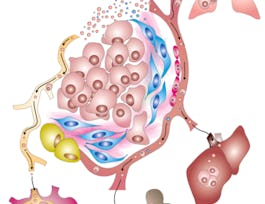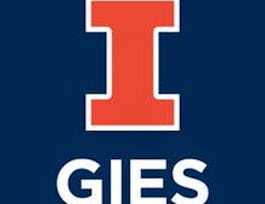This course aims to provide the basic knowledge about extracellular vesicles (EV) a generic term including exosomes, microvesicles, microparticles, ectosomes, oncosomes, prostasomes, and many others. It covers areas such as EV history, nomenclature, biogenesis, EV cargo as well as the release and uptake mechanisms, collection and processing prior to isolation, different isolation methods, characterization and quantification techniques.


Basics of Extracellular Vesicles
Taught in English
Some content may not be translated
18,358 already enrolled
(341 reviews)
Skills you'll gain
Details to know

Add to your LinkedIn profile
5 quizzes
See how employees at top companies are mastering in-demand skills


Earn a career certificate
Add this credential to your LinkedIn profile, resume, or CV
Share it on social media and in your performance review

There are 5 modules in this course
In this module, we will introduce the course and the field of extracellular vesicles. We will discuss the nomenclature and the history of extracellular vesicles as well as the organisms and places that have been shown to release/contain extracellular vesicles.
What's included
4 videos1 reading1 quiz
In this module, we will focus on the biogenesis and release of extracellular vesicles as well as the uptake mechanisms of extracellular vesicles when they are encountered by a recipient cell. This module also covers the different RNA, protein and lipid types present in extracellular vesicles as well as a brief overview what the functions of these molecules are. Furthermore, the techniques that are commonly used to detect these molecules as well as databases that can be useful to use when analyzing the cargo of extracellular vesicles will be highlighted.
What's included
6 videos1 quiz
In this module, we will focus on the collection and processing of cell culture media and body fluids prior to isolation of extracellular vesicles. We will discuss some of the considerations and guidelines that are important during the collection of staring material and isolation of extracellular vesicles. This module will help you with the different choices, such as anticoagulants, collection time points and protein inhibitors, which are important for the outcome when working with a particular body fluid compared to conditional media or other body fluids. This module will also illustrate some example of studies on extracellular vesicles from body fluid such as blood, urine, breast milk and cerebrospinal fluid and why it is of interest to analyse extracellular vesicles from these body fluids.
What's included
5 videos1 quiz
This module highlights some of the different methods used to isolate extracellular vesicles. Here the basic concepts for methods such as differential ultracentrifugation, density gradient, size exclusion and kit-based precipitation will be covered and some guidelines will be presented. Furthermore, this module will cover how the techniques are used in the field of extracellular vesicles as well as their limitations and benefits.
What's included
6 videos1 quiz
This module highlights some of the different techniques used to characterize extracellular vesicles. Here the basic concepts for techniques such as electron microscopy (EM), cryo-TEM, flow cytometry, atomic-force microscopy and nanoparticle tracking analysis will be covered and some guidelines will be presented. Furthermore, this module will cover how the techniques are used in the field of extracellular vesicles as well as their limitations and benefits.
What's included
7 videos1 quiz
Instructor

Offered by
Recommended if you're interested in Basic Science

University of California, Irvine

Korea Advanced Institute of Science and Technology(KAIST)

University of Illinois at Urbana-Champaign

University of Michigan
Why people choose Coursera for their career




Learner reviews
Showing 3 of 341
341 reviews
- 5 stars
78.59%
- 4 stars
18.76%
- 3 stars
2.05%
- 2 stars
0.29%
- 1 star
0.29%
New to Basic Science? Start here.

Open new doors with Coursera Plus
Unlimited access to 7,000+ world-class courses, hands-on projects, and job-ready certificate programs - all included in your subscription
Advance your career with an online degree
Earn a degree from world-class universities - 100% online
Join over 3,400 global companies that choose Coursera for Business
Upskill your employees to excel in the digital economy
Frequently asked questions
Access to lectures and assignments depends on your type of enrollment. If you take a course in audit mode, you will be able to see most course materials for free. To access graded assignments and to earn a Certificate, you will need to purchase the Certificate experience, during or after your audit. If you don't see the audit option:
The course may not offer an audit option. You can try a Free Trial instead, or apply for Financial Aid.
The course may offer 'Full Course, No Certificate' instead. This option lets you see all course materials, submit required assessments, and get a final grade. This also means that you will not be able to purchase a Certificate experience.
When you purchase a Certificate you get access to all course materials, including graded assignments. Upon completing the course, your electronic Certificate will be added to your Accomplishments page - from there, you can print your Certificate or add it to your LinkedIn profile. If you only want to read and view the course content, you can audit the course for free.
You will be eligible for a full refund until two weeks after your payment date, or (for courses that have just launched) until two weeks after the first session of the course begins, whichever is later. You cannot receive a refund once you’ve earned a Course Certificate, even if you complete the course within the two-week refund period. See our full refund policy.


